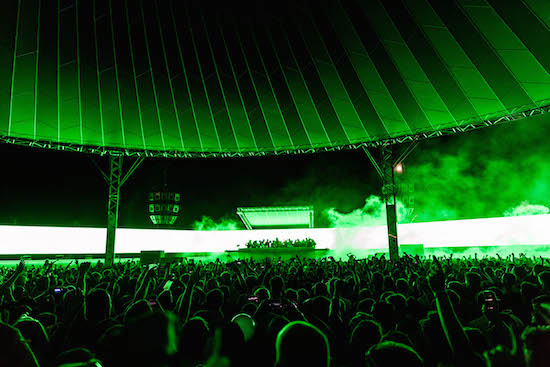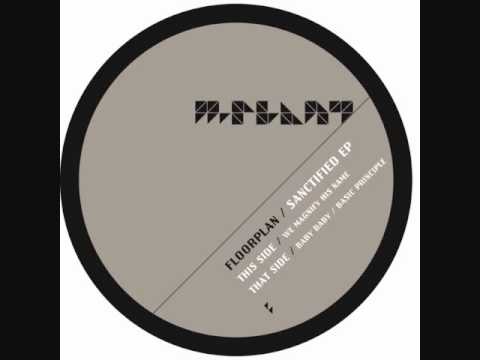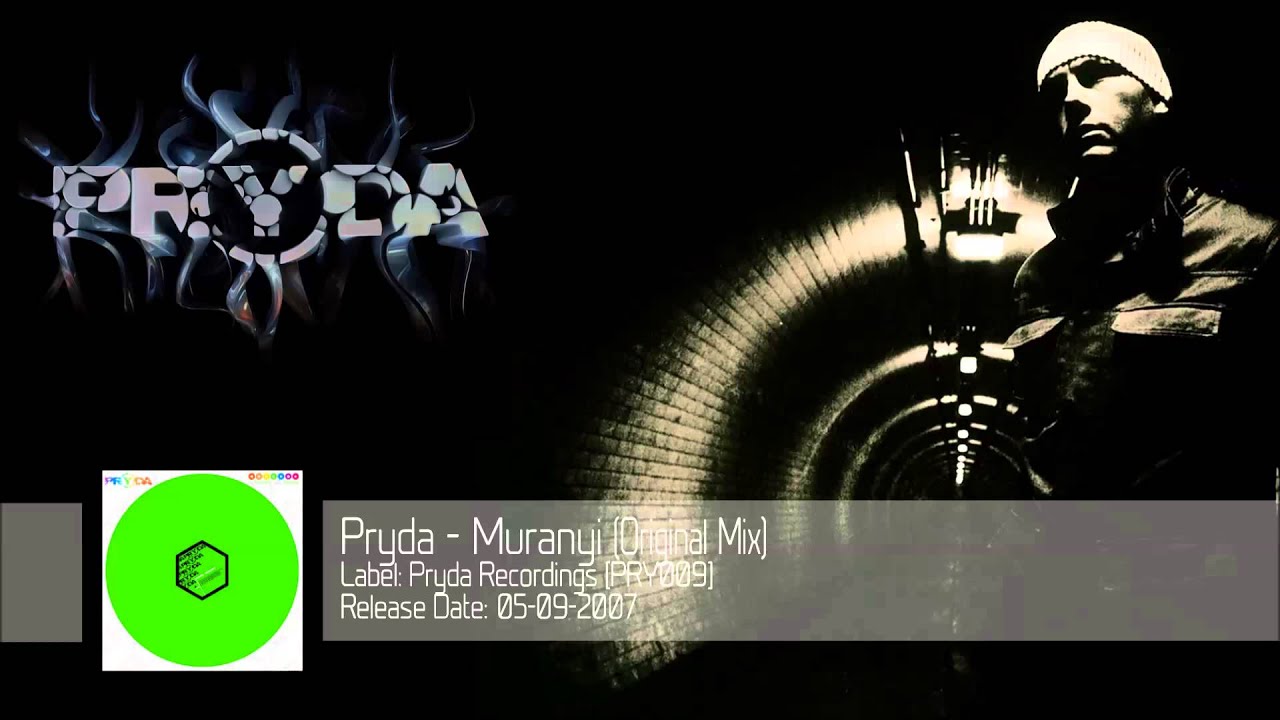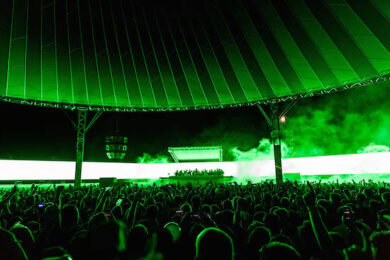It’s Thursday night and Amsterdam’s vast Muziekgebouw aan ’t IJ has been plunged into full darkness as Autechre begin an hour-long assault of the senses on those gathered for what has been billed as this year’s Dekmantel opening concert, the first in the festival’s three-year history. The venue, with its upper level seating area and lofty ceiling, is one that seems more akin to orchestral performances and classical music. Tonight though, it hosts the piercing, flaying textures of the Warp pair who, for an hour, draw on the more extreme elements of their work, performing mostly unrecognisable material free, as expected, of any time structure or tradition doing away with the grand room with which they have been presented and rendering all else, aside from their sound, irrelevant to the experience. "Dekmental" is what I’ve been told to expect and this isn’t quite it, but there’s plenty more time left for that – three days and nights to be exact.
The opening concert is a stark contrast to what lies ahead with the rest of this year’s entertainment. Around 15 hours later and attention is on the main event itself and the open air, part-park and part-forest surroundings of the Amsterdamse Bos, just outside Amsterdam, that have hosted Dekmantel since its beginnings in 2013. Giving myself a little time upon arriving on site to find my bearings, it quickly becomes clear just how compacted Dekmantel still is – it takes barely ten minutes to walk from one side of the site to the other – despite the lashings of praise that have been heaped upon the festival by many, both DJs and punters alike, in its last two years. Growing from the 5,000 capacity of 2013 to selling out of the 10,000 ticket-allocation some time ahead of the site opening its gates over the last two years, less spirited organisers would have perhaps seized upon the festival’s rapidly burgeoning reputation and scouted for a larger site or, worse still, considerably increased capacity within its established surroundings, leading to overcrowding and a less friendly atmosphere. Dekmantel’s co-founders, Thomas Martojo and Casper Tielrooij, have resisted that and the festival is certainly all the better for it.
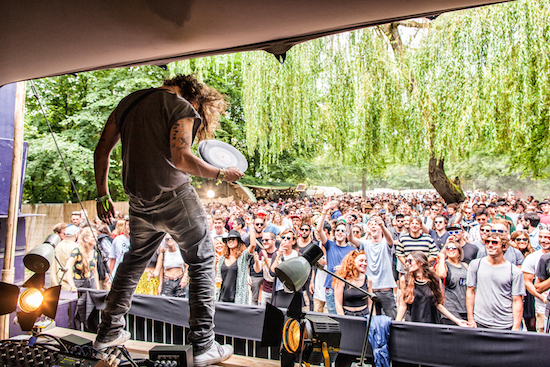
Throughout the weekend, nowhere feels too busy, too aggy or too stuffy to comfortably dance and enjoy oneself across the five stages on site – all of them, most importantly, programmed to a tee, an assortment of electronic music’s finest producers and DJs mostly playing in surroundings completely tailored to their selections and very often to crowds on the same wavelength. Arriving at the site for the first time on Friday, the patent drinking game jokes are abound for every Underground Resistance or The Trilogy Tapes T-shirt on sight, with myself falling victim to the latter. Heading firstly to the Selectors Stage in the early afternoon, led by our heroic driver Vincent, to check out former Trouw resident and Amsterdam local San Proper, a sizeable crowd is already out in full force on the Amsterdamse Bos as he eccentrically works through a selection of classic disco and soul, often making little effort to mix his choices but instead letting the tracks – such as Midnight Star’s ‘Midas Touch’ – do the business.
All five of Dekmantel’s stages on the main site have their own unique merits, but it’s this one, with its overhanging willow trees acting as the centrepoint, shadowing over the gathered dancers, that particularly stands out. Gving over time to some of the finest selectors in the world – over the course of the weekend there are sets from Motor City Drum Ensemble, Donato Dozzy, Solar, even a five-hour back-to-back-to-back marathon between Floating Points, Hunee and Antal – the area is one in which revellers can easily stay for an entire day with enough variety to ensure there’s never a dip in interest. Checking in at the stage on Saturday afternoon following part of a characteristically on point set from Palms Trax over at the RBMA Lab, another of Trouw’s former residents and a masterful digger and selector Young Marco is cutting through a selection of obscurities and crowd-pleasing disco, tribal and house cuts plucked from all over the world. I gleefully arrive as he spins what becomes something of a Dekmantel anthem over the weekend, Tabu Ley Rochereau’s ‘Hafi Deo’, and soon head off happy into the distance to work my way through more of the festival’s obscenely stacked line-up.
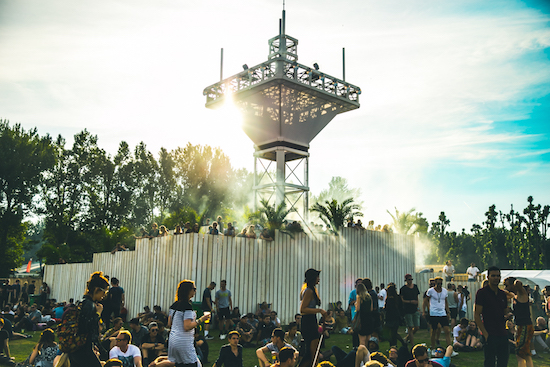
With only five stages at the Amsterdamse Bos, you would perhaps be forgiven for thinking Dekmantel is more of a relaxed affair, free of the head-scratching clashes and rushing around of so many other festivals. Yet the bill, and each stage, is so expertly curated to lovers of house, techno and club music in many of its glorious forms, that I’m torn throughout the weekend, always faced with at least two acts I had, before the weekend, considered a must-see. For this reason, much of Young Marco and Palms Trax’s sets go missed – much to my dismay – in order to ensure that I can catch what damage Shackleton has in store for the techno-heavy UFO tent. A three hour-closing set from the Hessle Audio triumvirate leads to missed opportunities to catch Donato Dozzy and I-F casting spells over the Selectors Stage during their respective sets, the latter of which I am later informed throws in ABBA’s ‘Gimme, Gimme, Gimme’, and the response I too am reliably told is one of ecstatic abandon. Sure, these casualties are gutting, but there’s no arguing that this is a sign of an electronic music festival doing what it should do – focusing firmly on the music – and what’s more, having built up a loyal following in its three-year history thus far and continuing to invite back DJs and producers year after year there’s always next time.
Within just a few hours of Friday’s entertainment getting going, thousands are already gathered at the main stage ready to give themselves over to the groove of one Mr Ricardo Villalobos playing alongside Perlon label head Zip. Coming just a few short weeks after that infamous Cocoon In The Park episode, it quickly becomes apparent that we are catching Villalobos on a good day – or perhaps that the man himself was doomed those weeks ago to playing to an unappreciative crowd – as he and Zip drift seamlessly through a selection of hazy minimal house, tribal-influenced beats and a smattering of crowd-pleasers too – take George Morel’s ‘Let’s Groove’ for example. Three hours fly by with nary a dull moment and as the pair reach the halfway mark and Villalobos drops a slightly pitched down ‘Baby Baby’ by Robert Hood’s Floorplan alias, the sun pays us a visit thrusting energy levels to their peak with those gathered at the outdoor main stage riding out the high through to the end, from there, as a parasol is promptly brought forward to mask Ricardo from the unexpected burst of heat from above. The decision to place two of the weekend’s biggest names so early in the schedule may have raised some eyebrows among our assembled group, but by the end, it was undeniable that this was a move very well made.
Taking in the last few hours of the day programme affords us sets from Objekt and Joy Orbison. The former strays slightly from his usual take on harder techno drawing on some smoother selections when playing his second set of the day in the more open Boiler Room area following his UFO tent appearance. Joy Orbison follows up Mike Servito’s acid selections on the Selectors Stage with his and Boddika’s own take on the music in the form of gritty, unreleased collaboration ‘Severed Seven’ before moving through disco-inflected house and bass-heavy UK Garage from the likes of El-B. Attention soon turns to the night programme, which this year takes on a considerably different form to that of last year’s owing to the closure of the much storied Trouw club at the start of the year – the sight of the building amidst the process of being redeveloped as a ‘Student Hotel’ opposite my hotel room was certainly a depressing one. Taking place across the expansive Melkweg club’s four rooms and hosting a bill fully announced in advance of the festival, in contrast to last year, it all gets going as soon as the party winds down at the Amsterdamse Bos, wrapping up at 7am and marking Dekmantel out as a festival for those with stamina, or at least some means of stimulation.
The after-hours line-up is every bit as impressive as that of the day’s events too boasting sets from Omar S, Surgeon, Derrick May and a whole load more. Call Super is playing a set of neatly paced refined house and techno in the smaller downstairs ‘Oude Zaal’ room upon my arrival on Friday, going on to play an unannounced b2b set with good friend Objekt as I’m excitedly later told by fellow members of the assorted crew, much to my own frustration. All the way at the top of the club, Tessela and Untold are going track-for-track in the ‘Rabozaal’, one of Melkweg’s largest but darkest rooms, with the pair playing two hours of forward-thinking UK techno and various strands of bass-infused club music. In the early hours of Monday morning, another of these expertly curated tag team sets comes from Tama Sumo and Prosumer. Certainly no strangers to sharing a set of headphones, they work through a myriad of techno and house selections in the early hours of their three-hour set in the closing hours of the Dekmantel weekend, before they loosen up and Prosumer makes the move of reaching for a Lisa ‘Left Eye’ Lopes cut.

Andy Stott proffers various recognisable samples and signifiers from his past work in an early hours Monday morning set rattling chests downstairs, while immediately following him in the opposite main room, Paranoid London, accompanied by collaborator Mutado Pintado, thrash out their brand of grimy acid, though the lighting director’s decision to reach for the house lights through a large part of their set throws many a head down. The masterstroke of the weekend’s late night entertainment though comes in the form of the teaming of A Made Up Sound and Peverelist who play a five hour back-to-back set in the RA Theater, a rectangular room draped in black curtains all the way around. After catching an hour of DJ Harvey downstairs moving back and forth between sleazy disco and pummelling techno in the main room, there is still time to catch the remaining two or so hours of their set as they carry on a little past the curfew. Much like the pairing of Tessela and Untold the previous night, the two trade off on the more dynamic edges of the various strands of techno and bass music currently coming out of the UK, particularly from Pev’s Brizzle origins with his own forthcoming remix of Hodge’s ‘Amor Fati’ standing out as a particularly weighty selection, before they run through a dizzying final 30 minutes of 90s proto-rave club music pushing the tempo higher and higher and giving an outing to Sound Of The Future’s 1995 classic ‘The Lighter’ to close, leaving those remaining to skank it out in the near darkness.
Uncompromising techno is the order of the day across the weekend in the UFO tent, a simple, large white tent with Funktion 1 sound system filled with thousands of revellers fist-pumping all weekend to every banging kick drum and thumping bass hit. DVS1 doesn’t go easy on Saturday night barely letting the BPM drop below 130, while Nina Kraviz plays a selection of mostly forthcoming material from her own трип label before unexpectedly finishing with Energy 52’s 90s Ibiza anthem ‘Café del Mar’. One of the more nuanced of those in the tent is Shackleton whose Saturday afternoon set stands out as an obvious highlight. At this point, a credit should go to accompanying PR Fallon MacWilliams for her brilliantly summarised description, on the way to his set, of what makes the Shackleton live experience so extraordinary. It’s simple really: "he just makes the most completely fucked-up music that you can still dance to". Teasing out drowsy, menacing vocal lines in tracks such as ‘Deadman’ and ‘New Dawn’, as well as drawing on newer material in ‘Freezing Opening Thawing’ and characteristically claustrophobic improvisations, an hour seems all too fleeting, but it certainly ratchets up the energy for what remains on Saturday.
Moving onwards, and perhaps unusually from the perilous sounds of Shackleton, to the main stage for Four Tet, Kieran Hebden is on the best form I have ever seen him, unashamed to treat those in the Saturday evening sun to a set of crowd-pleasing, BPM-shifting club tracks, taking in music from Daphni, his own Percussions side project, the blissful trip of Floating Points’ ‘Nuits Sonores’ and an early spine-tingling highlight of Olof Dreijer side project Oni Ayhun’s ‘OAR003-B’ with its swirling synths cynically, but oh so cleverly, drawing on the tear ducts. As Hebden continues in this main-stage-friendly stride and he and the thousands in front hit their peak, a recognisable melody comes to the fore – somewhat recognisable to me at least. In my confusion, I reach, unashamedly might I add, for Shazam and there it is, confirmed: Pryda – ‘Muranyi’. "He’s playing Eric Prydz?!" It’s a curveball for sure, but one that, based on the reaction of myself and those around me, Hebden pulls off neatly as only he could. Its big-room, EDM synths ebb and flow, building ever so dumbly and yet so pleasingly to the track’s climax as that worn-out cliché comes to mind of club music’s euphoric ability to draw strangers together; it really does. Leave your cynicism at the airport.
Immediately following Four Tet on the main stage, perhaps one of few lesser logical programming decisions, it’s time for The Wizard, Jeff Mills. Part-DJ set, part-909 jam, Jeff doesn’t fall short of his headline billing – but that was fucking obvious – returning one year on from closing out Dekmantel’s main stage. Unlike the dull box-like set-up of most festivals’ main stages, Dekmantel’s simply consists of a raised DJ booth, surrounded on both sides by a wall of impressive LED screens and a large dome-like structure looming over the crowd in front. With the day turned to night, the screens are most effectively put to use during Jeff’s two-hour set as shades of pink, red and purple envelope the crowd and smoke machines plunge the area into a dense, hazy fog – the prime setting for his unrelenting, unrivalled, high-octane techno and acid, and yes, of course he played ‘The Bells’, a move that promptly cuts short my run to a nearby portaloo.
Sunday sees me somewhat take up residency at the RBMA Lab stage, a partly open air greenhouse, decorated with various forms of greenery, in a far corner of the site. Early in the afternoon, Minimal Wave boss Veronica Vasicka has no time for warming up playing a selection of jacking house, techno and EBM, much like the variety of music presented on her label. Blending Levon Vincent’s ‘Anti-Corporate Music’ and an unidentifiable techno cut, and riding out the combination effortlessly for several minutes, Vasicka is a DJ well deserving of her rising status and worthy still of a lot more attention as she expands her Minimal Wave label further with the club-orientated Cititrax offshoot. Following her, another DJ that is often all too underrated, Golden Pudel resident Helena Hauff. For 90 minutes, Hauff spins a set of all vinyl selections, chain-smoking throughout (needless to say she doesn’t miss a beat) and offering up her take on EBM-infused techno. Eerie, alluring synth workouts occasionally rise to the fore, subsiding flawlessly from track to track and the fist pumpers barely have a second to stretch and regain composure. The highlight? The immense kicks of MPIA3’s acid workout ‘ELY’. What is somewhat baffling is just why the majority of Dekmantel’s scarce female representation on this year’s bill is mostly limited to one day and particularly to playing in succession in one corner of the site, with Vasicka, Hauff and Steffi, in collaboration with Virginia, all playing in the run-up to the Hessle trio at The Lab. Without wishing to speculate on the reasons for the lack of women on this year’s bill – DJs such as Lena Willikens and The Black Madonna, guests of Dekmantel’s smaller one-day Lente Kabinet event earlier this year, would have been a welcome addition to the line-up for example – this chasm in gender representation must be noted, hopefully with a view to acknowledging the issue when it comes to booking next year’s event. Following on from the controversy surrounding the lack of female representation too on the Bloc line-up earlier this year, many other promoters and bookers must, of course, be wise to this also.
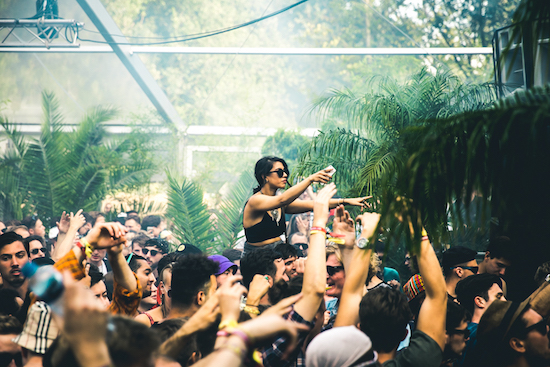
Before I head off to the Melkweg on Sunday to punish my body one last time, there’s just the small matter of a three-hour Hessle session, as the much revered trio of Ben UFO, Pearson Sound and Pangaea step up to the RBMA Lab to close out the weekend. Drawing from an arsenal of the kind of brand new, dynamic club music showcased weekly on the Hessle Rinse FM show, alongside classic crowd-pleasing and crate-digging selections, the hype levels continue to surge from the moment they begin, both on-stage and off. Around midway through the set, Ben strips it all back to deliver one of the weekend’s final defining moments in the form of Donato Dozzy’s Bee Mask re-interpretation ‘Vaporware 07’. Barely minutes later, we are cruising back at full speed and moving through UK funky, UK garage and 90s rave music, closing out with the 1991 Manix classic ‘Feel Real Good’ as Steffi, hanging around after her set, takes to the table housing the decks and mixer for a dance and fellow Ostgut Ton collaborator Virginia crowdsurfs all the way to the back of the greenhouse, graciously carried by the heaving, beaming crowd. An absolute hoot among a weekend full of them.

